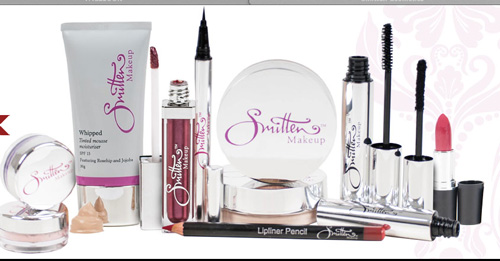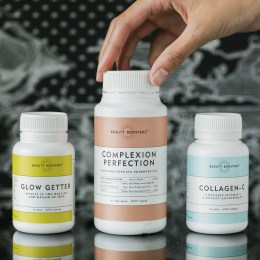If you’re a skin therapist of any kind, you’re already likely to be knowledgable about the link between inner-health and outer-beauty. Your informal but extensive study has equipped you well.
So much so, that despite the fact that you may not have not have studied nutrition in a formal setting, you’re hailed as the “go-to guru” in your social circle for those seeking health advice, especially when related to their skin.
This vested interest might compel you to share your wellness prowess with clients whose skin concerns aren’t completely resolving with in-clinic procedures and topical treatments.
While you can’t legally prescribe certain supplements (that someone with formal training can) you can most certainly feel confident in making professional diet and lifestyle recommendations according to their specific skin issue.
Chiza Westcarr started out as a dermal therapist but since honing her skin expertise, she sought out further education in the field of nutritional medicine.
She now advises her clients at the prestigious All Saints medi-clinic in Double Bay, Sydney, from a 360 degree perspective. She says having an innate knowledge of the skin from both standpoints allows her to offer the most effective solutions for even the most severe skin issues.
Speaking at Beauty Expo Melbourne next weekend, 25th-26th March, Chiza will school attendees on managing skin conditions (including rosacea and hypersensitivity) from within. The door is open to anyone interested in learning more about an holistic approach to skin treatments.
SPA+CLINIC talk with her about the limitations and scope for therapists looking to solicit advice on nutrition to their clients.
What formal training does a skin practitioner need to confidently broach the subject of nutrition and internal health with a client?
Formal training in nutrition is not a requirement for becoming a skin therapist but it is a good idea to take a personal interest in it since many skin disorders are linked to internal health.
Our clients are looking for answers and when they come into the clinic. Thus they are open to discussing the link between nutrition and skin health, so therapists armed with knowledge on the subject will come across as confident and competent.
It can be frustrating for therapists who are finding that using topical treatments alone are not yielding the desired outcome. Advising on nutrition also can lead to better results.
How can a skin therapist work to design an internal health plan with their clients and how do they best assert themselves as an authority on inner health (if they haven’t studied nutrition) when making recommendations?
This is a great question and one that I get often from skin therapists. A skin therapist is not a nutritionist so they cannot ‘assert themselves’ as an authority on inner-health. However, there are a number of ways they can offer advice.
While they cannot prescribe practitioner grade supplements, there are a growing number of nutritional antioxidant supplement ranges available to skin clinics that they can recommend. Although no formal qualification is needed in administering them, it’s important to be trained sufficiently under the support and guidance of a specialist, such as a naturopath for example.
Skin therapists can collaborate directly with an accredited nutritionist or naturopath where they find that a particular condition is beyond their scope of practice. They can refer the patient on to such a professional for a more comprehensive diagnosis and treatment plan, focusing on tackling the issue internally.
It goes without saying that in their capacity as skin therapist, they can recommend healthy food choices where they are absent and advise on cutting back on refined, processed food for improved health outcomes.
Which skin conditions can benefit from internal (nutritional) treatment and why?
There is strong evidence that diet and nutrition may help conditions including eczema, psoriasis, rosacea and acne.
These are all issues associated with inflammation and may have an association with gut permeability or “leaky gut syndrome”. (Breaches in the gut wall that allow partially digested food particles and toxins to permeate into the bloodstream setting up an inflammatory response, is commonly referred to as ‘leaky gut’.)
Dairy, gluten, sugar and overly processed or refined foods are widely believed to elicit an inflammatory response in the body, exacerbating these symptoms.
Thus making dietary adjustments to assist with addressing ‘leaky gut’ (starting with the introduction of probiotics, increasing fibre and eliminating the aforementioned culprits) may improve such skin problems. Of course a thorough consultation is required to determine the right plan for every individual. One size does not fit all.
Cutting out inflammatory foods may certainly help rosacea, but spicy food and alcohol can also cause a flare up. Therefore person-specific triggers need to be considered too.
Thinking about rosacea, in your talk at Expo, you’ll be explaining the differences between this and hypersensitivity. Why are they different but often confused?
Hypersensitivity occurs when the skin reacts in an “exaggerated” way to particular allergens that may be found in cosmetic products and fragrances for example, even to temperature extremes.
The immune system responds to the allergens by producing IgE antibodies which activate ‘mast cells’ that then trigger a cascade of inflammatory symptoms.
This starts internally, with a release of histamine and can manifest on the skin as erythema, barrier impairment, dryness or flakiness. It is often subjectively described as “burning”, “itching” and “stinging”.
Rosacea is also characterised by erythema and may or may not include skin that burns and stings. The superficial reddening of the skin in the case of rosacea is not an allergic reaction akin to hypersensitivity.
Rather rosacea is a vascular condition (associated with the circulatory system) that may be activated by person-specific triggers such as spicy food, alcohol and extreme temperatures.
The condition has a distinct “flush-like” appearance that butterflies out from the centre of the face across the nose and cheeks, and can also affect the forehead and chin. Rosacea is a progressive condition that may worsen if not treated.
While the etiology of rosacea is largely unknown, the condition is often linked to environmental factors and also genetics.
As a matter of fact, it is frequently referred to as the “Celtic Curse”, because it affects people with fair hair and fair skin most visibly. It is also more common in females than males, but tends to be more severe in men.
At what point in the overall clinic consultation process should a skin professional broach the subject of internal health with the client?
When a client first comes in they are given a general consultation form to fill out which includes targeted health related questions, enabling us to gear the client towards myself for a more in depth nutritional consult or to one of our dermal therapists for skin related treatments.
I always start the “inner health conversation” by going over their consultation form with them, trying to find a possible connection between their diet and lifestyle and key skin concern. This then presents an opportunity to discuss with the client.
Where there are obvious conditions like acne or rosacea presenting, I ask them about supplementation and diet (noting consumption of fast food, dairy, gluten which may be problematic for some). These are some of the ways we gain a greater insight into their nutritional deficiencies.

Chiza Westcarr has developed a reputation as an extremely engaging, knowledgeable speaker with a real passion for all things skin, recognising the real connection between gut-health and skin-health. She began teaching in 2000, imparting current, relevant information to both medical practitioners and skin therapists alike and although her focus has turned to clinical consultation, she is often invited to write for magazines and speak nationally and overseas on various skin-related topics.
Her impressive list of credentials include – CIDESCO, ITEC Hons., CIBTAC, B.Business Studies, Bachelor of Health Sciences (Clinical Dermal Therapies), Master’s Degree in Human Nutrition. Chiza has almost completed her studies in Nutritional Medicine.




